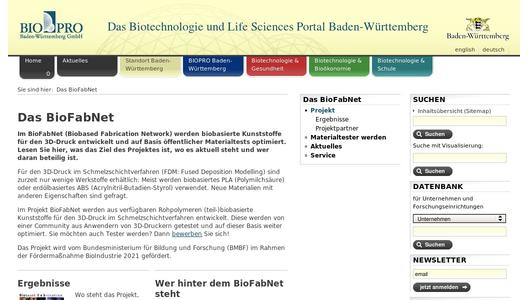Für den 3D-Druck im Schmelzschichtverfahren (FDM, Fused Deposition Modelling) sind nur wenige Werkstoffe erhältlich: Meist werden biobasiertes PLA (Polymilchsäure) oder erdölbasiertes ABS (Acrylnitril-Butadien-Styrol) verwendet. Materialien mit anderen Eigenschaften sind gefragt.
Im Projekt BioFabNet werden aus verfügbaren Ausgangsmaterialien (teil-)biobasierte Kunststoffe für den 3D-Druck entwickelt. Die Öffentlichkeit soll dabei in die Materialtests einbezogen werden: Wer einen 3D-Drucker besitzt und etwas Erfahrung im Druck mitbringt, kann sich als Tester bewerben. Weitere Infos hierzu unter http://www.biofabnet.de
Auf Bioökonomie aufmerksam machen
Ziel des BioFabNet ist, biobasierte Werkstoffe bekannt zu machen, damit sie schneller auf dem Markt angenommen werden. Über dieses Handlungsbeispiel soll die Öffentlichkeit auf die zukünftigen Möglichkeiten der Bioökonomie aufmerksam gemacht werden.
Unter einer Bioökonomie versteht man eine Wirtschaftsform, die nicht Erdöl, sondern nachwachsende Rohstoffe nutzt, um Waren und Energie zu erzeugen. So soll die wachsende Weltbevölkerung klimaschützend und ressourcenschonend versorgt werden. Die Erhaltung der Biodiversität auf der Erde genießt dabei höchste Priorität. Die Bioökonomie berührt zahlreiche Branchen wie die Land- und Forstwirtschaft, die Energiewirtschaft, den Chemie- und Kunststoffsektor, die Textilindustrie oder die Umwelttechnik.
Biobasierte Kunststoffe werden nicht aus Erdöl, sondern aus nachwachsenden Rohstoffen hergestellt. Aktuell werden etwa Stärke aus Mais und Zucker aus Zuckerrüben, Lignin und Zellulose aus Hölzern oder Pflanzenöle aus Rizinus und Raps als Ausgangsmaterialien verwendet.
Projektpartner
Am BioFabNet beteiligt sind die BIOPRO Baden-Württemberg GmbH, das Institut für Kunststofftechnik (IKT) der Universität Stuttgart und das Fraunhofer-Institut für Produktionstechnik und Automatisierung IPA. Gefördert wird das BioFabNet über eine Laufzeit von zwei Jahren vom Bundesministerium für Bildung und Forschung (BMBF) im Rahmen der Fördermaßnahme BioIndustrie 2021.

